Exceptional acting, transcendent themes characterize Lab Theater’s ‘Mothers and Sons’
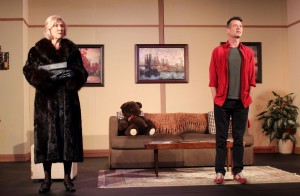 Terrence McNally’s Mothers and Sons opened at the Laboratory Theater of Florida on Friday, January 6. It is yet another Lab Theater production characterized by exceptional, nuanced acting and transcendent existential themes.
Terrence McNally’s Mothers and Sons opened at the Laboratory Theater of Florida on Friday, January 6. It is yet another Lab Theater production characterized by exceptional, nuanced acting and transcendent existential themes.
The play’s storyline is straightforward (no pun intended). Katharine Gerard shows up at the 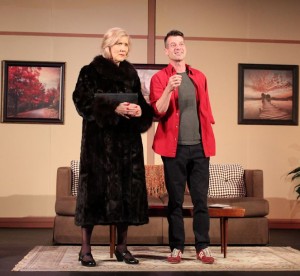 Upper Westside apartment of her deceased son’s gay lover on the pretense of returning her son’s journal. Homophobic to the core, Katharine has never come to terms with her son’s sexual orientation or his death by AIDS twenty years ago. She has always – and openly – blamed Cal for turning her son gay and causing his death. But now she discovers something new with which to find fault. Unlike her, Cal has moved on with his life, taking a husband and having a child who can carry on his name and legacy.
Upper Westside apartment of her deceased son’s gay lover on the pretense of returning her son’s journal. Homophobic to the core, Katharine has never come to terms with her son’s sexual orientation or his death by AIDS twenty years ago. She has always – and openly – blamed Cal for turning her son gay and causing his death. But now she discovers something new with which to find fault. Unlike her, Cal has moved on with his life, taking a husband and having a child who can carry on his name and legacy.
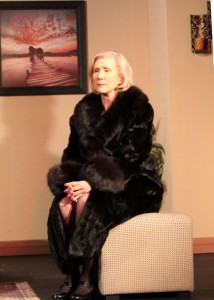 “Mothers and Sons isn’t a ‘gay play’ or an ‘AIDS play,’ observes The Lab’s Artistic Director Annette Trossbach. “Yes, it has those themes but at its core, Mothers and Sons is a play about reconciliation, healing, and hope. It is a moving story with irresistible characters and one that we are lucky to be able to present so soon after it closed on Broadway!”
“Mothers and Sons isn’t a ‘gay play’ or an ‘AIDS play,’ observes The Lab’s Artistic Director Annette Trossbach. “Yes, it has those themes but at its core, Mothers and Sons is a play about reconciliation, healing, and hope. It is a moving story with irresistible characters and one that we are lucky to be able to present so soon after it closed on Broadway!”
But there is precious little reconciliation or healing to be found in McNally’s poignant and incisive depiction of “Andre’s mother,” who finds her son’s sexuality so abhorrent that in the twenty years that have transpired since her son’s death, she has not been able to bring herself to read the journal he kept. She wears her full-length Nieman Marcus 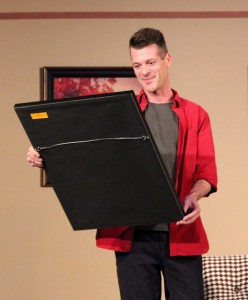 fur like a suit of armor as her son’s besieged and beleaguered gay partner tries his best to connect with her on some level, any level. But the coat is mere metaphor for her underlying emotional armor designed to ward off all human emotion.
fur like a suit of armor as her son’s besieged and beleaguered gay partner tries his best to connect with her on some level, any level. But the coat is mere metaphor for her underlying emotional armor designed to ward off all human emotion.
Katharine Gerard is deeply damaged. But her son’s sexuality was merely the lightning rod she used to justify the gulf that existed between them. In truth, she’d hoped that her son would validate her decision to marry a man she never loved in order to escape the backwater town in which she grew up. But even as a small child, Andre’ refused to share himself with 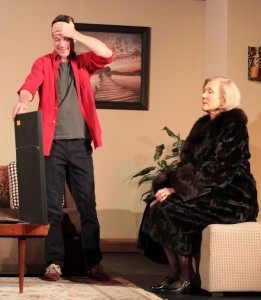 her. He never saw her as a living, breathing person, only as “Andre’s mother.” Subconsciously, she retaliated by refusing to see or accept him for the man he truly was, relegating him to the cardboard role of “Katharine’s son.”
her. He never saw her as a living, breathing person, only as “Andre’s mother.” Subconsciously, she retaliated by refusing to see or accept him for the man he truly was, relegating him to the cardboard role of “Katharine’s son.”
But Ms. Trossbach is right. Mothers and Sons is about reconciliation, as spare as that precious commodity may be. But with Andre’ now gone, Katharine’s last chance to find forgiveness and peace comes in the guise of her son’s former lover, who stands in as Andre’s surrogate. But for 80 of the play’s 90 minutes, Katharine is simply unable (or unwilling) to accept the comfort Cal repeatedly offers. 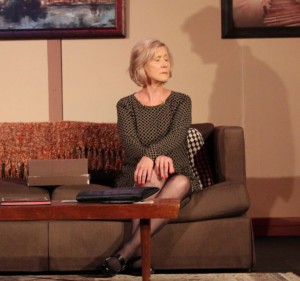 Thank God for precocious little boys and Oreo cookies!
Thank God for precocious little boys and Oreo cookies!
It may not be possible to say enough good things about the performances given in this production by Brenda Kensler, Jason Drew, Joseph Yazvac and River Reed.
Kensler’s challenge in playing Katharine may be the most difficult of all. Not only is she required to portray a woman seemingly devoid of human warmth and filled with hatred so unrelenting that 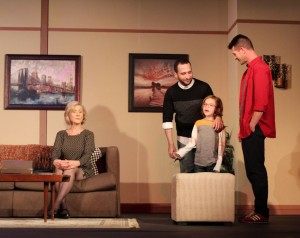 she could easily allow “that ottoman put me in a rage,” but she must follow in the footsteps of Tyne Daly, who reprised the role on Broadway. Kensler does not disappoint. She is superb as the prickly, hyper-critical sniper who wears a shell of porcupine quills beneath her Neiman Marcus fur.
she could easily allow “that ottoman put me in a rage,” but she must follow in the footsteps of Tyne Daly, who reprised the role on Broadway. Kensler does not disappoint. She is superb as the prickly, hyper-critical sniper who wears a shell of porcupine quills beneath her Neiman Marcus fur.
Drew is equally masterful. He sets the tone in the play’s opening scene, as he tries to break the ice with his former lover’s taciturn and sullen mother 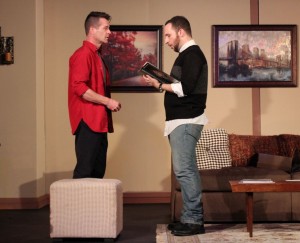 as they look out the window at the Brownstone across Central Park that was once occupied by Jackie Kennedy Onassis. From subtle hand gestures to wistful reminisces to incredulous eye rolls, Drew infuses Cal Porter with a realism that makes you forget he is merely an on-stage character in a play. This is especially evident in his interactions with his husband, Will. We all have past relationships. Most of us try to quarantine them
as they look out the window at the Brownstone across Central Park that was once occupied by Jackie Kennedy Onassis. From subtle hand gestures to wistful reminisces to incredulous eye rolls, Drew infuses Cal Porter with a realism that makes you forget he is merely an on-stage character in a play. This is especially evident in his interactions with his husband, Will. We all have past relationships. Most of us try to quarantine them 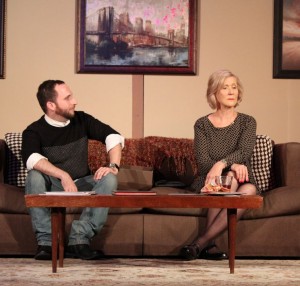 so that they never infiltrate the present. Not only must Drew’s character unexpectedly recall and relive his relationship with Andre’, he must do so as his husband looks on with, yes, some degree of jealousy over the ghost with whom he can never compete.
so that they never infiltrate the present. Not only must Drew’s character unexpectedly recall and relive his relationship with Andre’, he must do so as his husband looks on with, yes, some degree of jealousy over the ghost with whom he can never compete.
Yasvac is equally adept as Cal’s husband, Will – the uncompromising stand-in for gay men who came after and don’t always understand or appreciate the struggles of those who suffered and 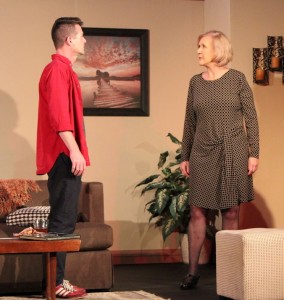 survived the AIDS epidemic of the late 1980s and ‘90s. But it is newcomer River Reed that the audience with fall in love with most. This charming scene-stealer cuts through the emotional morass taking place between and among his parents and Andre’s mother by giving her what she craves most – being acknowledged as a person by being called by her name rather than her title.
survived the AIDS epidemic of the late 1980s and ‘90s. But it is newcomer River Reed that the audience with fall in love with most. This charming scene-stealer cuts through the emotional morass taking place between and among his parents and Andre’s mother by giving her what she craves most – being acknowledged as a person by being called by her name rather than her title.
And so it is that Bud not only delivers reconciliation. Through him, McNally indeed expresses hope for a brighter future.
RELATED POSTS.
- ‘Mothers and Sons’ opens at The Lab on January 6
- Brenda Kensler is Katharine Gerard in Lab Theater’s production of ‘Mothers and Sons’
- Jason Drew is Cal Porter in Lab Theater’s ‘Mothers and Sons’
- ‘Mothers and Son’ play dates, times and ticket information













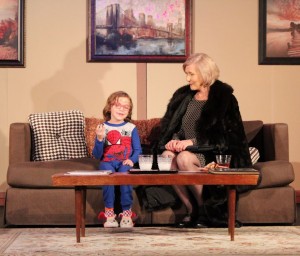

 Tom Hall is both an amateur artist and aspiring novelist who writes art quest thrillers. He is in the final stages of completing his debut novel titled "Art Detective," a story that fictionalizes the discovery of the fabled billion-dollar Impressionist collection of Parisian art dealer Josse Bernheim-Jeune, thought by many to have perished during World War II when the collection's hiding place, Castle de Rastignac in southern France, was destroyed by the Wehrmacht in reprisal for attacks made by members of the Resistance operating in the area. A former tax attorney, Tom holds a bachelor's degree as well as both a juris doctorate and masters of laws in taxation from the University of Florida. Tom lives in Estero, Florida with his fiancee, Connie, and their four cats.
Tom Hall is both an amateur artist and aspiring novelist who writes art quest thrillers. He is in the final stages of completing his debut novel titled "Art Detective," a story that fictionalizes the discovery of the fabled billion-dollar Impressionist collection of Parisian art dealer Josse Bernheim-Jeune, thought by many to have perished during World War II when the collection's hiding place, Castle de Rastignac in southern France, was destroyed by the Wehrmacht in reprisal for attacks made by members of the Resistance operating in the area. A former tax attorney, Tom holds a bachelor's degree as well as both a juris doctorate and masters of laws in taxation from the University of Florida. Tom lives in Estero, Florida with his fiancee, Connie, and their four cats.